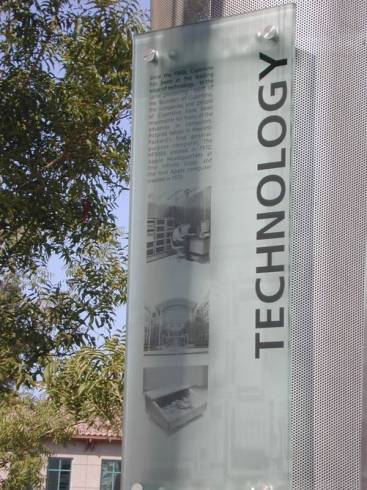|
Solid software for HP Servers |
Highlights from our recent on-line customer news. The links and full articles are available at www.robelle.com/news |

|
|---|
Whatís Up DOCumentation
|
Cupertino
Acknowledges HP 3000 Glenn
Cole writes: Two years ago, a hotel and condos were built in front of the
Cupertino City Center at the busy Stevens Creek and De Anza Blvd intersection.
Earlier this year, a plaza was constructed with sculpture, benches (with free
wireless Internet access), fountains, and a few historical markers. One of the markers
is labelled Technology. It reads: Since the 1960s,
Cupertino has been at the leading edge of technology. In the same pioneering
spirit of the founders of Cupertino, the companies and people of Cupertino have
been responsible for many of the advances in computers. Pictured below is
Hewlett-Packard's first general-purpose computer, the HP3000, created in 1972;
Apple Headquarters at One Infinite Loop; and the first Apple computer created
in 1976.  Homesteading and MPE TipsBased
on the technical support calls that we are receiving, it appears that many HP
3000 systems are being put in the care of staff with only Unix and Windows. So
we have decided to write a series of introductions to MPE for these lucky
souls. First
thing you need to know is that MPE has Unix-like features integrated into it
(via Posix), but most applications and software tools were written with the
non-Posix features. Basic
MPE consists of a single shell (the command interpreter) and a file system that
has only 3 levels (user, group, account) but has many file attributes
including record size/type, max file size, extents and passwords (called
lockwords). The 3rd party product MPEX is an alternate shell, as is sh.pub.sys
(the Posix shell). Click the link above for a cross reference from unix commands to MPE commands. MPE for UNIX Users,
Part 2: HP 3000 Login and Logoff. So you are an experienced Unix/Windows SysAdmin who has been given the responsibility of looking after your firm's network of HP 3000s. And you have never seen the MPE operating system before. One of the first things that you might do is log onto one of the systems, using the login instructions and passwords left you by the previous administrator. Click the link above for A complete description of what happens during login. We
have posted Birket Foster's slides from the OpenMPE
meeting at HPWorld last month (they are in Microsoft Word format). Important to
read them and contact the board if you have any interest in receiving patches
to MPE after end-of-hp-support. OpenMPE needs purchase order committments by
Nov 30th. Update:
here is the proposed budget
in PDF format, and here
are the original slides in horizontal PDF format, in case you want to check
anything in our MS Word version. Client Systems Is
Still Keen on the 3000 Dan
Cossey of Client Systems writes: "Client
Systems, HPís long standing exclusive e3000 Distributor for over 10 years and
itís subsidiary Phoenix 3000 (HPís contractually authorized After Market
Partner) is still here and have been very active in supplying HP Channel
Partners, their customers and other critically important 3rd party partners
with needed e3000 solutions. And yes, even since the discontinuance back in
October 2003. We all know that many of our customers are not ready to migrate
for some time to come. So whether you are in need of a 9x8, 9x9, 99X, a-class
server, n-class server, a license upgrade, hardware upgrade or support, we are
still here service the market and hopefully will be servicing you too. ... If
you want more information, need a quote or even want to make a purchase,
contact one of the following for immediate assistance." Mike
Murphy - 303.873.6502 - mikem@clientsystems.com |
Qedit Tips Undo Those Mistakes Users often tell us that
they know there are lots of Qedit features that they have never tried. While
the best way to learn may be to "Just Do It", this can be dangerous
unless you also have a way to "Just Undo it". That's where the
appropriately-named Undo command comes in. You can easily test the
results of any command when you know that you can reverse the changes. Try the
following: †††† /justify format 10/20†† {fill in spaces make tidy paragraphs}†††† /divide (10,30,40) 1/5† {split lines a columns 10, 30 and 40}†††† /lsort all keys 10/20†† {sort file on columns 10 thru 20}†††† /change 1 "foo" "bar"†† {prefix "foo" if lines contain "bar"}
You can Undo any text-altering
commands up to the last Text or Open command, except Delete All. You can cancel
Delete All before the next command line is executed by using Control-Y. Suprtool TipsSuprtool has so many date functions that it is difficult to know where to start in presenting them. Click the link above to read our two-part article for The 3000 Newswire about date functions in Suprtool. Between
a Robelle customer and two of our Suprtool support team at Allegro: Barry Lake
and Barry Durand, ending with the statement "This is close to the best
support I have received from any IT organization". HP-UX and Migration
Planning How can I improve
overall HP-UX system performance? From
the comp.sys.hp.hpux
FAQ with updated links from Robelle There
are, of course, many answers to this question. Many people have noticed that
HP's conservative choices in some configuration areas affect performance,
especially as compared to Solaris. A couple examples: o
'fs_async' kernel parameter o
'async' NFS option An
abundance of performance tuning tips are provided by HP in the following tuning
guides: o
JFS Tuning and
Performance (Journalized File System) August 2004. o HP-UX Kernel Tuning and Performance Guide v3.1, 03/15/00. And offers a program to lure HP-UX users away. Links/ Resources/ Industry News †Firefox:
Fight Worms and Spyware The Register reports that "HP's largest user group has decided to withhold key information from reporters and analysts in an effort not to upset the company with the damaging data." They go on to report in detail on the portions of the user survey that Interex revealed during an HPWorld session. Sybase Offers Free Linux Version Limited
to use of one CPU, 5GB of data storage and 2GB of RAM. Zero software licensing
costs. Zero maintenance costs. |